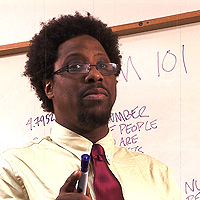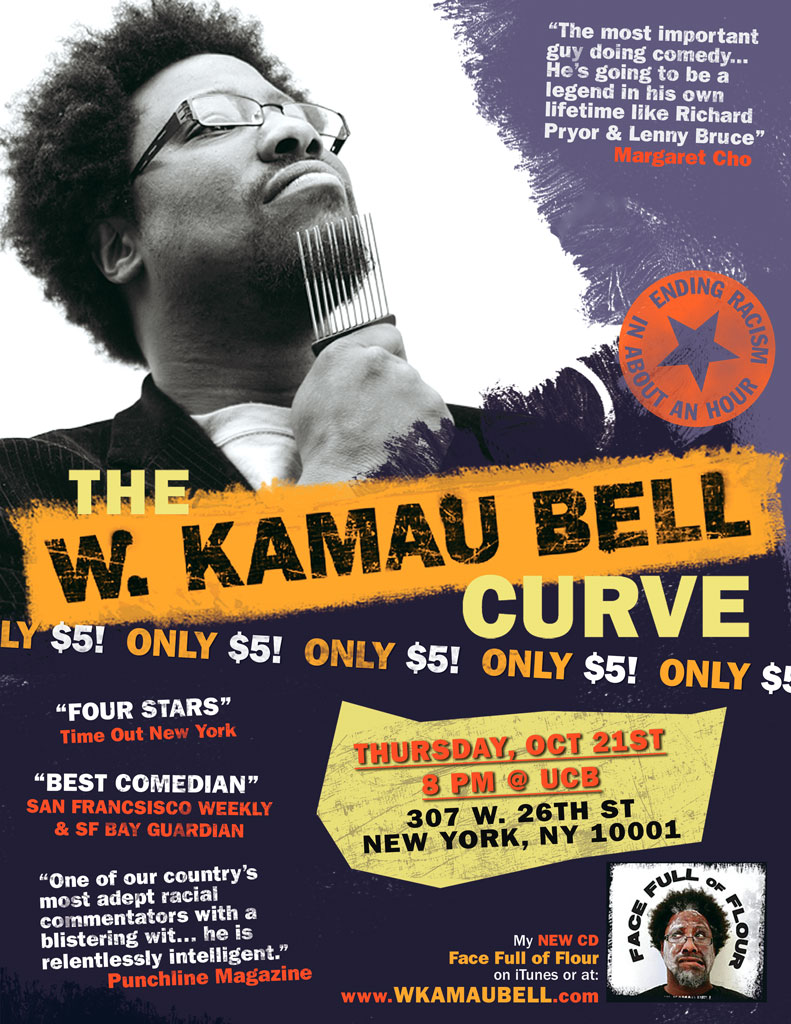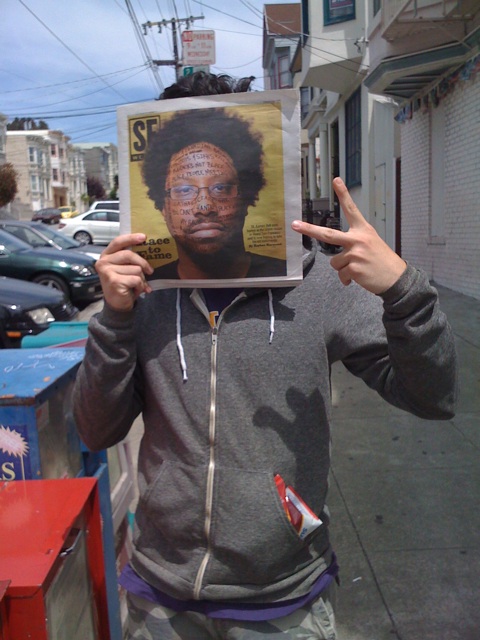OK. Being interviewed by Feministing doesn't make me a feminist, but it doesn't make me NOT a feminist. Does it? / Doesn't it? Read it below and let me know... By Chloe | Published: November 21, 2010

W. Kamau Bell is a stand-up comic and stand-up guy (yes, that is the best joke I can manage). Bell is best known for his one-man shows, the most recent of which is The W. Kamau Bell Curve: Ending Racism in About an Hour. Bell aptly describes the show, which is constantly updated to reflect the news of the day, as “one part manifesto, one part diatribe, and several parts funny.”
Bell’s comedy focuses on race and particularly on the national conversation about race, something that it can be hard to get people laughing about.
As you can see, Bell’s is smart, incisive comedy. As you can imagine, it was an absolute pleasure to sit down with Bell and talk about The Matrix, the future of feminism, and just how cool his mom is. And now, without further ado, the Feministing Five, with W. Kamau Bell.
Chloe Angyal: What got you into comedy, and specifically into the kind of comedy that you do?
W. Kamau Bell: That’s kind of two different stories. Comedy was something I wanted to do since I was a little kid watching TV, watching Eddie Murphy on Saturday Night Live and thinking “that looks cool.” Bill Cosby was a big influence. His big stand up thing was called “Bill Cosby Himself” and it was the thing that landed him The Cosby Show, and I remember seeing that and thinking it was like magic.
I was an only child, so I was left alone with my own brain a lot, and I thought I was fascinating. It was just me and my mom and she told me I was hilarious. As a kid comedy was always something I wanted to do, but I didn’t know how to do it. How do you start that? I was never the class clown – me and my best friends were all clowns. So I didn’t think of myself as the funny one, because we were all funny. When I was twenty-one, my best friend Jason knew that I wanted to go into comedy because I talked about it enough, and he found an open mic night near his house. So we went and we watched, and I got the courage to go up. Without Jason I never would have done it, because he went with me the first two years, every show I performed at. I wouldn’t have done it without him because I just didn’t have that kind of intestinal fortitude.
I would always talk about race, but whenever I’d talk about race, especially in Chicago where everything with race is so screwed up, I’d notice this tension in the room. Admittedly, I wasn’t very funny, but there was this tension, so I thought, “well, I’m not going to talk about race at all for a while,” and then I would talk about race exclusively. My mom is really a race warrior, so it was always in my DNA. Black History Month was all year long in our household. We were always talking about it. I felt like it was the family business and thought that I didn’t want to do that. And then about five years after I started in comedy I decided that I really wanted to focus on the stuff that I cared about. The comics I liked were the ones who had agendas, comics who want the audience to think differently when they leave, like Bill Hicks and Lenny Bruce. So that became a totem for me, to make the audience think differently. Later I started to like comics who weren’t doing what they thought the audience wanted them to do, and were just following their own paths. Margaret Cho is an example of that. She’s just following her own direction, and I’ve always liked that. READ THE REST OF THE INTERVIEW HERE...


 The W. Kamau Bell Curve is a comedic exploration of the current state of America’s racism, combined with a little (unknown) history, a little Powerpoint, and a whole bunch of Kamau.
The W. Kamau Bell Curve is a comedic exploration of the current state of America’s racism, combined with a little (unknown) history, a little Powerpoint, and a whole bunch of Kamau.
 \
\ Putting together race and comedy can and sometimes is a recipe for disaster (side note: I think Hitler needs to be retired as comedy fodder, having heard a few too many of them last night), but in The W. Kamau Bell Curve: Ending Racism in About an Hour, on now at
Putting together race and comedy can and sometimes is a recipe for disaster (side note: I think Hitler needs to be retired as comedy fodder, having heard a few too many of them last night), but in The W. Kamau Bell Curve: Ending Racism in About an Hour, on now at 

